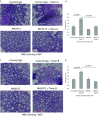Human monoclonal antibodies against Clostridium difficile toxins A and B inhibit inflammatory and histologic responses to the toxins in human colon and peripheral blood monocytes
- PMID: 23629713
- PMCID: PMC3697353
- DOI: 10.1128/AAC.02633-12
Human monoclonal antibodies against Clostridium difficile toxins A and B inhibit inflammatory and histologic responses to the toxins in human colon and peripheral blood monocytes
Abstract
Clostridium difficile infection (CDI) is a common and debilitating nosocomial infection with high morbidity and mortality. C. difficile mediates diarrhea and colitis by releasing two toxins, toxin A and toxin B. Since both toxins stimulate proinflammatory signaling pathways in human colonocytes and both are involved in the pathophysiology of CDI, neutralization of toxin A and B activities may represent an important therapeutic approach against CDI. Recent studies indicated that human monoclonal antibodies (MAbs) against toxins A and B reduce their cytotoxic and secretory activities and prevent CDI in hamsters. Moreover, anti-toxin A and anti-toxin B MAbs together with antibiotics also effectively reduced recurrent CDI in humans. However, whether these MAbs neutralize toxin A- and toxin B-associated immune responses in human colonic mucosa or human peripheral blood monocyte cells (PBMCs) has never been examined. We used fresh human colonic biopsy specimens and peripheral blood monocytes to evaluate the effects of these antibodies against toxin A- and B-associated cytokine release, proinflammatory signaling, and histologic damage. Incubation of anti-toxin A (MK3415) or anti-toxin B (MK6072) MAbs with human PBMCs significantly inhibited toxin A- and toxin B-mediated tumor necrosis factor alpha (TNF-α) and interleukin-1β (IL-1β) expression. MK3415 and MK6072 also diminished toxin A- and toxin B-mediated NF-κB p65 phosphorylation in human monocytes, respectively, and significantly reduced toxin A- and B-induced TNF-α and IL-1β expression as well as histologic damage in human colonic explants. Our results underline the effectiveness of MK3415 and MK6072 in blocking C. difficile toxin A- and toxin B-mediated inflammatory responses and histologic damage.
Figures







Similar articles
-
Fidaxomicin and OP-1118 Inhibit Clostridium difficile Toxin A- and B-Mediated Inflammatory Responses via Inhibition of NF-κB Activity.Antimicrob Agents Chemother. 2017 Dec 21;62(1):e01513-17. doi: 10.1128/AAC.01513-17. Print 2018 Jan. Antimicrob Agents Chemother. 2017. PMID: 29038278 Free PMC article.
-
Fidaxomicin inhibits Clostridium difficile toxin A-mediated enteritis in the mouse ileum.Antimicrob Agents Chemother. 2014 Aug;58(8):4642-50. doi: 10.1128/AAC.02783-14. Epub 2014 Jun 2. Antimicrob Agents Chemother. 2014. PMID: 24890583 Free PMC article.
-
Loratadine as an Anti-inflammatory Agent Against Clostridium difficile Toxin B.J Infect Dis. 2024 Sep 23;230(3):545-557. doi: 10.1093/infdis/jiae021. J Infect Dis. 2024. PMID: 38243838 Free PMC article.
-
Clostridium difficile infection in 2010: advances in pathogenesis, diagnosis and management of CDI.Nat Rev Gastroenterol Hepatol. 2011 Feb;8(2):67-8. doi: 10.1038/nrgastro.2010.215. Nat Rev Gastroenterol Hepatol. 2011. PMID: 21293502 Review.
-
Toxin-specific antibodies for the treatment of Clostridium difficile: current status and future perspectives.Toxins (Basel). 2010 May;2(5):998-1018. doi: 10.3390/toxins2050998. Epub 2010 May 7. Toxins (Basel). 2010. PMID: 22069622 Free PMC article. Review.
Cited by
-
Circulating antibody and memory B-Cell responses to C. difficile toxins A and B in patients with C. difficile-associated diarrhoea, inflammatory bowel disease and cystic fibrosis.PLoS One. 2013 Sep 10;8(9):e74452. doi: 10.1371/journal.pone.0074452. eCollection 2013. PLoS One. 2013. PMID: 24058568 Free PMC article.
-
Development and characterization of phage display-derived anti-toxin antibodies neutralizing TcdA and TcdB of Clostridioides difficile.Microbiol Spectr. 2023 Sep 5;11(5):e0531022. doi: 10.1128/spectrum.05310-22. Online ahead of print. Microbiol Spectr. 2023. PMID: 37668373 Free PMC article.
-
The Impact of Therapeutic Antibodies on the Management of Digestive Diseases: History, Current Practice, and Future Directions.Dig Dis Sci. 2017 Apr;62(4):833-842. doi: 10.1007/s10620-017-4479-0. Dig Dis Sci. 2017. PMID: 28197743 Review.
-
Clostridium difficile recurrence is characterized by pro-inflammatory peripheral blood mononuclear cell (PBMC) phenotype.J Med Microbiol. 2014 Oct;63(Pt 10):1260-1273. doi: 10.1099/jmm.0.075382-0. Epub 2014 Jul 7. J Med Microbiol. 2014. PMID: 25001105 Free PMC article.
-
Therapeutic Mechanism of Macrophage Inflammatory Protein 1 α Neutralizing Antibody (CCL3) in Clostridium difficile Infection in Mice.J Infect Dis. 2020 Apr 27;221(10):1623-1635. doi: 10.1093/infdis/jiz640. J Infect Dis. 2020. PMID: 31793629 Free PMC article.
References
-
- Kelly CP. 2012. Current strategies for management of initial Clostridium difficile infection. J. Hosp. Med. 7(Suppl 3):S5–S10 - PubMed
-
- Kelly CP, LaMont JT. 2008. Clostridium difficile—more difficult than ever. N. Engl. J. Med. 359:1932–1940 - PubMed
-
- Savidge TC, Pan WH, Newman P, O'Brien M, Anton PM, Pothoulakis C. 2003. Clostridium difficile toxin B is an inflammatory enterotoxin in human intestine. Gastroenterology 125:413–420 - PubMed
Publication types
MeSH terms
Substances
Grants and funding
LinkOut - more resources
Full Text Sources
Other Literature Sources
Molecular Biology Databases

